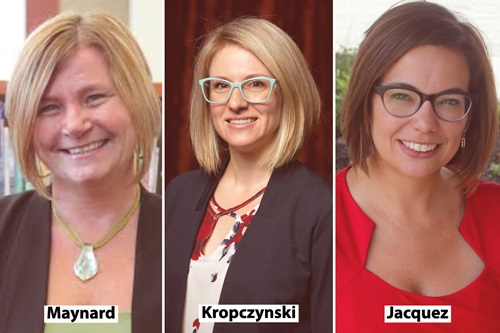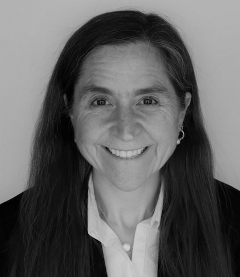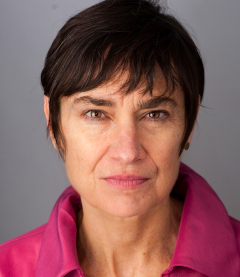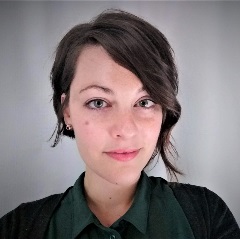Findings Staff Report | Aug. 13, 2021
Across Cincinnati this summer, three new research projects got underway as part of a new initiative at the University of Cincinnati called the Community Change Collaborative.
In Avondale, neighbors—including neighborhood youth—began building a local history initiative that includes an oral history project, online archive and local history shelf at the Avondale branch of the Cincinnati & Hamilton County Public Library.
And on one of Cincinnati’s hillsides, connecting UC neighborhoods to the downtown basin, UC researchers started convening with neighbors in the Clifton Heights, University Heights and Fairview neighborhoods (CUF) to bring a set of stairs to life, with an art project that is both eye-catching and promotes healthy lifestyles. 
The final project now underway is citywide and related to racial and environmental injustice. In Cincinnati and cities across the nation, the consequences of climate change are falling disproportionately on those who are most marginalized and often have done the least to contribute to the problem. A Community-led Climate Resilience Planning project hopes to address these forms of discrimination.
“Sometimes larger innovation starts by asking the community its present needs for research,” says Assistant Professor at the School of Information Technology Jess Kropczynski, Ph.D., one of the three leaders of C³. “Community buy-in is key. There can be persistent problems that exist within a global narrative, happening in our own backyard.”
Kropczynski is joined by CECH Associate Dean Kathie Maynard, Ph.D., and A&S Psychology Professor Farrah Jacquez, Ph.D., leading the C³, one of the investments the university has made related to its 10-year plan Research2030 and will be housed starting next year in the Digital Futures research complex.
Every spring going forward C³ will fund new action teams. Interested researchers should look for a call for proposals later this fall on the Office of Research’s funding page. Max award is $20,000. Community groups and individuals who want to get involved or have questions are asked to contact Kropczynski by email at kropczjn@ucmail.uc.edu.
Now, let’s meet the first cohort of Action Teams, working from the theme Equitable Cities:
Avondale Neighborhood History Initiative
UC researcher: Anne Delano Steinert, visiting assistant professor, Department of History
Community partners: Cincinnati & Hamilton County Public Library; Avondale Development Corporation
The Community Change Collaborative grant will support the first phase of the Avondale Neighborhood History Initiative. UC’s Center for the City will partner with the Avondale Branch Library branch to build a local history initiative. This summer the project began by employing seven Avondale youth, grades 8-10, to research the history of Avondale, host two scanning bees and create local history binders for the Avondale Branch Library. They have been led by UC undergraduate history major, Divya Kumar. The project also employs history doctoral student Erena Nakashima, who built the online Avondale Neighborhood Archive. So far, the online archive has received more than 50 submissions from Avondale community stakeholders.
Step Up to Art: Improving Health by Elevating Cincinnati’s Staircases as Neighborhood Connectors
UC researcher: Kate Bonansinga, professor, director of School of Art 
Community partners: Spring in Our Steps; CUF Neighborhood Association, City of Cincinnati
Step Up to Art will harness community input and involvement in the creation of a public artwork that will improve the upper part of the Ohio Avenue stairs that connects to Bellevue Park. Focus groups of residents met this summer to talk about how the stairs are currently used and how they could be improved, and artist portfolios were presented this month to the community. One artist team was selected. Project leaders are working now to acquire permits from the city and plan to begin implementing the art in October. This will serve as a pilot for the improvement of the staircase pedestrian transportation system throughout the city. Expected outcomes include 1) more connectivity between neighborhoods and their varying socio-economic demographics 2) the creation of unique public spaces, which will, in turn, create a more integrated and equitable city and 3) the promotion of neighborhood identity and pride.
Community-led Climate Resilience Planning for a More Equitable Cincinnati
UC researcher: Carlie Trott, assistant professor, Department of Psychology 
Partner: GroundWork Ohio River Valley
The principles of equity and justice are a must as we plan for and transition towards more sustainable urban futures. A key focus of this project is to ensure that the perspectives, needs and goals of residents in Cincinnati’s most critically affected neighborhoods are front and center as revisions are made to the Cincinnati Green Plan, a document that will guide Cincinnati’s climate policy in the critical years to come. Our research action team consists of scholars in psychology, health, and history working together with Groundwork and the City of Cincinnati Office of Environment and Sustainability to advance the Climate Safe Neighborhoods partnership. This pilot project will simultaneously advance research on equitable engagement for neighborhood-level climate resiliency planning while taking tangible steps to reflect the specific needs and goals of critically affected communities in the rewriting of Cincinnati’s Green Plan.